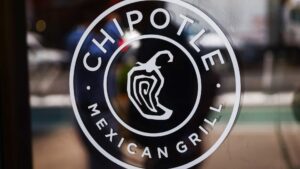Understanding the Ripple Effect: Tariff Hikes, Avocado Supply Chains, and Chipotle’s Resilience
In today’s volatile global trade environment, the recent announcement of potential tariffs on Mexican imports has sent shockwaves through various sectors, including the beloved restaurant industry. With this backdrop, Chipotle Mexican Grill has recently risen to the forefront of discussions, prompting a closer look at how the company is navigated its supply chain needs amid such changes.
The Tariff Landscape and Chipotle’s Strategy
Wall Street is uneasy with the prospects of a 25% tariff on imports from Mexico, particularly as it pertains to the restaurant supply chain. According to Chipotle CEO Scott Boatwright, approximately 50% of the burritos’ key ingredient—avocados—originate from Mexico. During an interview with CNBC’s Jim Cramer, Boatwright explained how Chipotle has successfully mitigated the risks associated with relying heavily on one country for avocados.
“Our supply chain team has done a remarkable job over the past couple of years with vendor diversification across all ingredients, specifically avocado,” Boatwright stated. "We’ve diversified into other countries like Peru, the Dominican Republic, and Colombia,” emphasizing that only half of Chipotle’s avocados now come from Mexico. This proactive approach showcases Chipotle’s commitment to maintaining quality and consistency, regardless of geopolitical pressures.
As these tariffs loom, the impact on food supply becomes increasingly critical. While the tariffs were postponed temporarily, the uncertainty continues to affect businesses and consumers alike. Tariffs can lead to increased costs, which may ultimately be passed down to customers in the form of higher menu prices. By diversifying their suppliers, Chipotle aims to shield itself from sudden price hikes and ensure stable menu pricing for its loyal customer base.
Financial Performance Amid Challenges
Despite the uncertainties posed by tariff discussions, Chipotle’s latest quarterly report presents a dual narrative. While the company exceeded earnings expectations, the forecast for same-store sales in 2025 caused a dip of more than 5% in extended trading. Food and packaging costs have indeed risen this year, driven by factors such as the need for consistent portion sizes and inflation—including higher avocado and dairy costs.
Understanding these cost pressures is vital for investors. Tariffs could exacerbate existing cost challenges, further squeezing margins. At Extreme Investor Network, we believe it’s crucial for investors to keep a keen eye on companies’ pricing strategies in light of fluctuating ingredient costs. A balanced approach in analyzing both short-term impacts and long-term goals will provide a clearer picture of Chipotle’s financial health.
Innovative Approaches to Talent Acquisition
In a noteworthy move reflecting adaptability, Chipotle recently opened a record 304 new restaurants in the past year. To support this growth, the company has embraced artificial intelligence to streamline its hiring processes. Boatwright revealed their partnership with software company Paradox, which introduced an AI assistant named "Ava Cado." This innovative tool simplifies the recruitment process by engaging candidates through initial screening questions and scheduling interviews.
“We leaned into AI hiring assistants about six months ago that have put us on better footing from a staffing perspective,” Boatwright confirmed. It’s clear that Chipotle is not just focused on expanding its physical footprint but is also modernizing its human resource strategies to sustain its growth trajectory.
Conclusion: A Future of Resilience and Ingenuity
Chipotle’s ability to pivot amidst tariff uncertainties, coupled with its investment in technology and strategic supplier diversification, places the company in a strong position for future growth. As investors, this presents an opportunity to consider how companies adapt in challenging environments. By focusing on resilient operational practices and leveraging innovative solutions—even in the face of adversity—Chipotle exemplifies what it means to thrive in uncertain times.
At Extreme Investor Network, we believe that understanding the nuances of these developments will empower investors to navigate the complexities of today’s economic landscape. Stay tuned for more insights and analysis on how global trade policies affect your investment strategy and the companies you care about.

